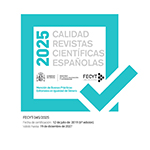Entre o soberano e a "voluntas publica": esboço para um itinerário de conceitos na Catalunha baixo-medieval1
Resumo
La transición de significados en el vocabulario político del siglo XIII demuestra la emergencia de una abstracción del poder que solo en la centuria siguiente se va a plasmar en el derecho público de base romanística. Lo que sucede en Cataluña en este período ha tenido grandes concordancias con lo vivido en el reino de Francia y el norte de Italia, donde el príncipe se convierte en el dominus potestatis en el contexto general de un gran mosaico jurisdiccional. Su figura evolucionó desde la autoridad del vínculo feudal a la abstracción de un eje jurídico, que permitiría superar el deber militar del vasallo a favor de la obligación universal del súbdito. Así, el rey actuaría por encima de una general jurisdicció que fortalecería su autoridad al mismo tiempo que la limitaba, mediante el acuerdo moral-religioso de la res publica christiana. La obra de juristas y teólogos en el Principado dirigía así la competencia del rey al estatus de figura pública, la cual, antes de forjar la autocracia monárquica, aislaría la voluntad personal del monarca en un concepto diferente de soberanía.Downloads
##submission.format##
Licença
La revista En la España Medieval, para fomentar el intercambio global del conocimiento, facilita el acceso sin restricciones a sus contenidos desde el momento de su publicación en la presente edición electrónica, y por eso es una revista de acceso abierto. Los originales publicados en esta revista son propiedad de la Universidad Complutense de Madrid y es obligatorio citar su procedencia en cualquier reproducción total o parcial. Todos los contenidos se distribuyen bajo una licencia de uso y distribución Creative Commons Reconocimiento 4.0 (CC BY 4.0). Esta circunstancia ha de hacerse constar expresamente de esta forma cuando sea necesario. Puede consultar la versión informativa y el texto legal de la licencia.
La revista En la España Medieval no cobra por tasas por envío de trabajos, ni tampoco cuotas por la publicación de sus artículos.












